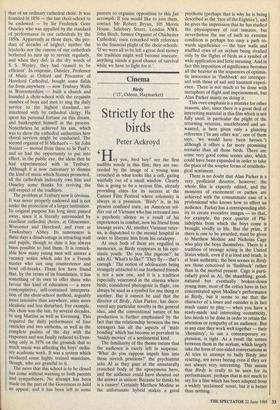Cinema
Birdy (`15', Odeon, Haymarket)
Strictly for the birds
Peter Ackroyd
Hey you, bird boy!' are the first audible words in this film; they are suc- ceeded by the image of a young man crouched in what looks like a cell, gazing wistfully out of a small window. Clearly this is going to be a serious film, already providing clues for its success at the Cannes Film Festival where solemnity is always at a premium. `Birdy' is, in his present confined state, an American sol- dier out of Vietnam who has retreated into a psychotic silence as a result of his experiences in combat; now his friend from teenage years, Al, another Vietnam veter- an, is dispatched to the mental hospital in order to liberate him from his catalepsy.
At once both of them are engulfed in memories, as Birdy reappears in his opti- mistic youth: 'Do you like pigeons?' he asks Al. 'What's to like?' They fly — that's enough.' The notion of adolescents being strangely attracted to our feathered friends is not a new one, and it is a tradition especially venerated in the cinema where birds, considered photogenic in flight, can always be used as a symbol for one thing or another. But it cannot be said that the director of Birdy, Alan Parker, has disco- vered any particular novelty in the general idea, and the conventional nature of his production is further emphasised by the fact that the relationship between the two teenagers has all the aspects of 'male bonding' which has become so prevalent in `buddy movies' of a sentimental kind.
The familiarity of the theme means that the audience is rarely left in suspense. `What do you suppose impels him into these stretch positions?' the psychiatrist asks Al as they gaze at the unnaturally crouched body of the eponymous hero, and the audience could have shouted out the answer in unison: Because he thinks he is a canary! Certainly Matthew Modine as the unfortunate hybrid makes a good psychotic (perhaps that is why he is being described as the 'face of the Eighties'), and he gives the impression that he has studied the physiognomy of real inmates, but nevertheless the use of such an extreme condition is perhaps too easy a path to- wards significance — the bare walls and muffled cries of an asylum being rivalled only by the flights of birds as a symbol of wide application and little meaning. And in fact this imposition of significance becomes all the heavier as the sequences of optimis- tic innocence in 'flashback' are intersper- sed with those of sad and haunted experi- ence. There is not much to be done with metaphors of flight and imprisonment, but Alan Parker insists on doing it.
This over-emphasis is a mistake for other reasons, also, since there is a great deal of interesting material in this film which is not fully used: in particular the plight of the returning veterans, uncelebrated and un- wanted, is here given only a glancing reference ('In any other war', one of them says, 'we would have been heroes.') although it offers a far more promising scenario than all those birds. There are some very good comic scenes also, which could have been expanded in order to take the place of the soupier forms of ornitholo- gical sentiment.
There is no doubt that Alan Parker is a very proficient director, however: the whole film is expertly edited, and the moments of excitement or pathos are achieved with the consummate ease of a professional who knows how to affect an audience. Parker has a corresponding abil- ity to create evocative images — so that, for example, the poor quarter of Phi- ladelphia from which the boys come is brought vividly to life. But the prize, if there is one to be awarded, must be given to Matthew Modine and Nicholas Cage who play the boys themselves. There is a tradition of teenage acting in the United States which, even if it is loud and brash, is at least authentic: the best scenes in Birdy are those conceived in 'flashback' rather than in the morbid present. Cage is parti- cularly good as Al, the shambling, good- natured but eventually broken-down young man; most of the critics have in fact concentrated upon Modine's performance as Birdy, but it seems to me that the character of a loner and outsider is in fact much easier to play — when you have a ready-made and interesting eccentricity, less needs to be done in order to retain the attention or sympathy of an audience. But in any case they work well together — their `chemistry', to use a contemporary ex- pression, is right. As a result the scenes between them in the asylum, which largely take the form of one-sided conversations as Al tries to attempt to bully Birdy into reacting, are never boring even if they are not always very interesting. This means that Birdy is really to be seen for its performances: perhaps that is not much to say for a film which has been adapted from a widely 'acclaimed' novel, but it is better than nothing.














































 Previous page
Previous page